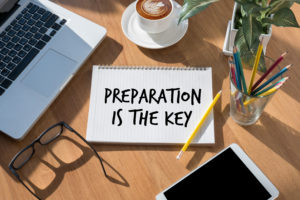Fear of public speaking is a very common problem, and not without good reason. After all, delivering a speech or presentation in front of other people can feel like putting ourselves in the firing line. It’s hard to avoid worries such as: “What if I can’t get my message across?” or worse still “What if the audience laughs at me?” or “What if they think I’m boring?”
While elsewhere on the Future Skills Blog we’ve talked about the most important public speaking skills to have in general. Today we’re going to focus on conquering your fear with five handy tips:
- Prepare thoroughly
- Practise, practise, practise
- Use relaxation techniques
- Fake it till you make it
- Take a step back
Fear of public speaking happens for many different reasons and takes many different forms, but if you follow all of the advice below then you’ll be well on the way to conquering your fear and becoming a great public speaker.
1) Prepare thoroughly
One of the biggest potential causes of anxiety is lack of preparation. While some aspects of our fear may be irrational, preparation is something that we (usually) have control over. Good preparation will lay the foundation for a confident, engaging speech or presentation. If you have confidence in your material, have carefully worked out what you want to say, know that it fits into the time you have to say it, and have all your visual aids or rhetorical tricks ready, there will be far fewer uncertainties. The worst fears are fears of the unknown, so get everything under your control with as much planning as you can.
When preparing your speech, keep the following advice in mind:
- Prepare well in advance – Whenever possible, start preparing long before the actual event. This will give you more time to grow comfortable and confident with your material, avoiding unnecessary anxiety closer to the time.
- Double- and triple-check your material – Go over everything many times and in detail to make sure that you know the material well and that it is up to scratch. Of course, preparing in advance will give you enough time to do this too.
- Prepare aids for yourself – Well-made cue cards and visual aids will help to anchor your speech and make sure that you don’t get lost on the day, which is very important when it comes to settling your nerves.
Toastmasters also have some handy tips on how to prepare a speech. The best way to be able to speak confidently is by having confidence in what you say, and making sure that you’re not afraid on the day starts long before the speech itself. This goes for our next top tip too…

2) Practise, practise, practise
Just as getting the of your speech right is important, so is practising it. In short, you cannot practise enough, and this may be the most important advice of all when it comes to conquering your fear. Public speaking is like skiing – you can’t just hit the slopes and hope for the best the first time you go out. It is a skill that requires practice if you want to avoid catastrophes and build your confidence. The more skilled you become, the less nervous you will feel and the more confidently you will be able to take risks, such as responding to unexpected comments from the audience.
Make sure you practise repeatedly and in a variety of ways. For example, practise in front of your friends or colleagues and ask for feedback. Record yourself giving your presentation. Or try it out in a range of venues and get someone to sit at the back of the auditorium and see if they can hear you. Remember that will need to speak more slowly that you normally would if you are to be heard clearly at the back of a large hall. If possible, get as much public speaking experience as you can before an important event so that you are used to the feeling of talking in front of a large group of people. This way, the fear that naturally comes from something new and unexpected will disappear.
It is also a good idea to learn from the best. Watch great public speakers to see what skills and techniques they use to engage their audience, then practise these skills yourself to build your confidence. TED Talks provide a great collection of short but engaging speeches to explore.
3) Use relaxation techniques
OK, you’ve prepared a great presentation and practised it time and time again…what about the day itself? For some people, no matter how much they have prepared, nerves on the day are inevitable, but this doesn’t mean that we can’t do something about them. That’s where relaxation techniques come in.
It is important to note that there is no one-size-fits-all solution to relaxation. Some exercises will be hugely effective for one person but useless for another, and so we all need to find the methods that work best for us. Common techniques include:
- Breathing exercises – This is a classic way to reduce anxiety. The Harvard Business Review has an article on this very topic including some exercises to try.
- Stretching – Much like breathing, stretching focuses our attention on our bodies and allows us to concentrate. The Institute of Public Speaking has some great physical exercises to try before a presentation.
- Exercise – Exercising before speaking can help to relax our bodies and get the endorphins flowing. Just make sure that the exercising isn’t so vigorous so that you tire yourself out or cause any injuries.
- Visualisation – This is more psychological than physical, and it involves imagining your speech before it happens as a way of controlling your anxiety. SpeakingAboutPresenting.com have an article on the best visualisation techniques, including busting some common myths.
By finding the right relaxation technique, you can deal with on-the-day nerves and deliver a great speech.

4) Fake it till you make it
This tip may sound slightly unusual at first, but the important thing to remember is that public speaking is a performance, and so just like a great actor, you can fake it. While simply believing that you are a great public speaker does not make it true (see our tip about practice!) it is important to have confidence, and that can come from playing the role of a great public speaker.
In reality, this means using things like body language (explored elsewhere on the Future Skills Blog) and personal presentation. For example, if you stand up straight and smile, you will naturally feel more self-assured and relaxed even if your brain has been telling you that you’re nervous. Choice of clothes can be important too – you should feel comfortable in what you are wearing but remember that your clothes and the way you walk on stage will cause the audience to form judgements about you before you open your mouth. Is this an occasion for a smart business suit and well-polished shoes, or jeans and a t-shirt? Even if you have adopted a casual style, make sure you are well groomed and your clothes are clean. Smile as you come up to your speaking position, and if you have been introduced by someone remember to acknowledge them.
Remember you are performing your speech, not just repeating it – so even when you are rehearsing, don’t just drone through the words. Think about the impact you want to make on your audience and match your tone of voice and your body language to your message. Make this part of your preparation and by the time you come to give your speech it will seem as much a natural part of it as the words themselves.
While these things don’t make you a great public speaker in themselves, they help you to feel more like one, and having a positive mindset is crucial when it comes to conquering nerves. With practice and training, confidence will eventually come from within, but it is still important to remember that public speaking is a kind of performance and dealing with outward signs can help a lot.
5) Take a step back
Of course, no matter how well-prepared you are, how many breathing exercises you have tried out, or how good you look, it can feel like these things go out of the window at the crucial moment. As we mentioned above, fear can be irrational and unexpected. When it comes to crunch time, adrenaline can take over and our brains almost seem to shut down.
This is why it’s vital to take a step back and check yourself. In short, we have to remind ourselves not to get carried away by fear. This might mean literally setting a reminder on your phone or asking your friend to tell you to stop, think, take stock and breathe. This isn’t always easy when the nerves are building up, but the problem will never be solved unless we actually remember to be cool, calm and rational. This includes reminding ourselves to take some of the steps mentioned above – after all, if we are nervous in the run-up to a speech we may well forget to do a stretching exercise or to stand up straight and smile. Self-awareness is key, and we can’t let ourselves get carried away in the moment.
It’s very easy when nervous to gabble through a speech so quickly that people struggle to make out your words, and certainly don’t have time to think about your ideas – force yourself to slow down. It’s also easy suddenly to forget what comes next – even if you don’t think you need to refer to cue cards, have them with you and turn to the next one at the appropriate moment. Or have a prompter in the audience with the text for your speech who can feed you the next line if you get lost – It doesn’t look very professional to have to be prompted, but it’s better than grinding to a complete halt and failing to get your message across. Knowing that you have these support mechanisms in place will reduce your stress levels and make you less likely to have to use them.
While it often feels as if our fear of public speaking is something which cannot be controlled, this couldn’t be further from the truth. We have explored how with preparation, practice, and a range of practical tools, it is perfectly possible for all of us to conquer those nasty nerves and deliver a knockout speech. Good luck!

